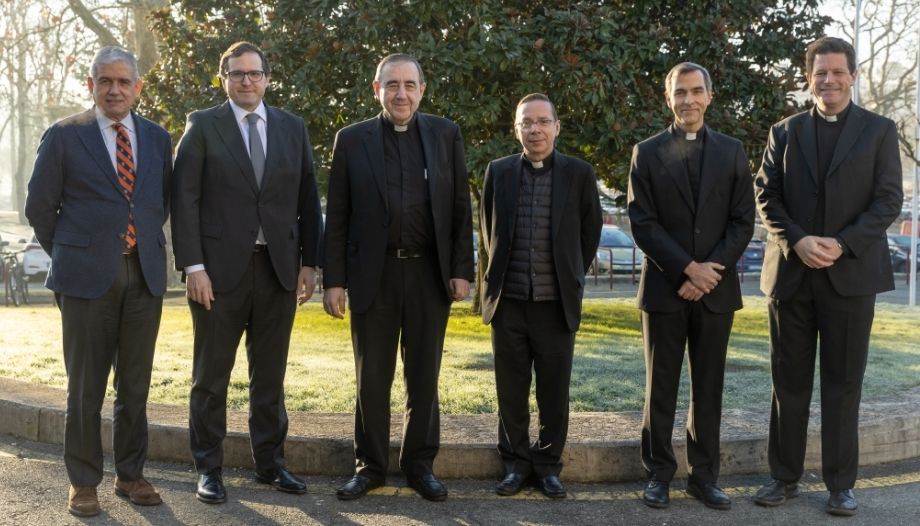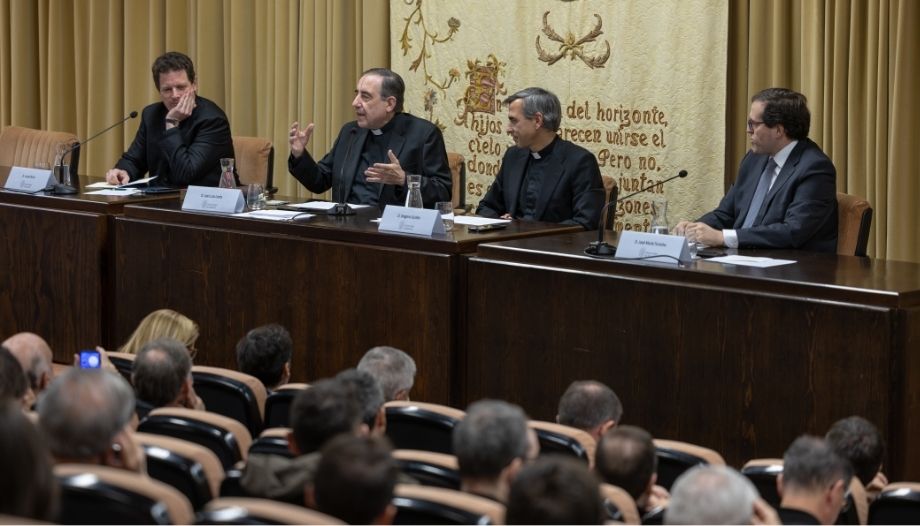During an academic conference held on January 20, in which more than 300 people participated, the University of Navarra has paid tribute to the professor Juan Luis Lorda (Pamplona, 1955), at the Faculty of Theology where he began teaching in 1983.
"We must make use of the wonderful intellectual heritage of many Christians who have known how to dialogue with their time and at the same time with Scripture," and also "recognize the formidable value of 20th century theology," said Professor Juan Luis Lorda in his speech.
Industrial engineer (1977), priest and Doctor of Theology since 1982, Juan Luis Lorda has published numerous treatises and manuals, theological and humanistic essays, Christian popularization books, articles, etc., in a deep scientific production. Precisely on the Theology of the twentieth century, and for the twenty-first century, he regularly writes in Omnes.
Looking at history
– Supernatural day Mariano Fazio, auxiliary vicar of Opus Dei; Santiago Herráiz, CEO and editor of Ediciones Rialp; and José María Torralba, professor of Moral Philosophy and Politics at the academic center.
In his speech, Professor Lorda underlined the immense gratitude he feels for having been a professor of Theology in such a good "and miraculous" environment as the University of Navarra. He also encouraged those who describe the world in which we live as complicated to look at history.
Meaning of Christian humanism
Juan Luis Lorda listed some challenges to which Christians must respond today, such as remembering that the God of Christian theology is God revealed in Christ. "If Christ is not the Word, God has not fully revealed himself and his love has not reached us, and we remain without salvation. Therefore, we need a believing reading of the Bible that tells the story of revelation, the story of the covenant and the story of salvation."
"To do this, we must make use of the wonderful intellectual heritage, so immense and beautiful, that we carry behind us, fruit of the faith and work of many Christians of different times. Believers who have known how to dialogue with their times and at the same time with Scripture," he said. And he added: "There is nothing similar in the world with such richness and coherence. This is the meaning of Christian humanism, which is rooted in faith and dialogues with each era.
Some challenges
In addition, he highlighted other challenges to which "we must respond" with that heritage, such as clarifying the causes of the post-conciliar crisis, reviewing the confrontation of Thomism with the New TheologyTheology of Liberation, "which provides discernment of the past without the need to judge anyone and with a projection into the future".
Praise from the dean
The dean of the Faculty of TheologyGregorio Guitián, for his part, highlighted the effort that Professor Lorda has always made to improve the Faculty, and praised his work to take it to many places "always leaving the flag very high".
He also expressed his gratitude in two ways: firstly, for the number of hours dedicated to the students, both in his academic work and at the Albáizar Hall of Residence; and secondly, "for the careful teaching he has given in this house and in the rest of the civil faculties of the University".

The University and its humanistic character
José María Torralba, Professor of Moral and Political Philosophy and Director of the Center for Civic Humanism, spoke about the connection between the University and its humanistic character. "The title of this lecture, the University, home of knowledge and place of friendship, comes from the obituary I was writing on the occasion of the death of the former rector, Alejandro Llano, last October. He said that the salvation of the university is in the books, and that is why the university must be the home of knowledge".
Professor Torralba pointed out that the University is "built on the rock that is wisdom". In this sense, he outlined wisdom as "the radiance that is given in a relationship of love and friendship, which is born by contagion and by the passion that we discover in others. In Christian humanism, that radiance comes from Christ." "In the discovery of passion for Christ is found service. No one is surprised if I speak of Professor Lorda's generosity in the service of teaching and the University: as a good university student, he does not settle in and always needs good challenges", he concluded. José María Torralba.
Christian humanism, present in books
The second round table of the day was led by Msgr. Mariano Fazio and Santiago Herraiz, in which they talked about reading and how it leads us to wisdom.
Monsignor Fazio referred to the letter Pope Francis wrote last August on the role of literature in the formation of priests: "Reading is a privileged access to the heart of man and for it to bear fruit it must be taken as an exercise of discernment".
The virtues of the classics
In this regard, he emphasized the virtues of the classicsThose readings that endure over time, that have a universal scope and that "give us instruments to distinguish the good from the bad, the beautiful from the ugly. The classics show that our human nature vibrates with beauty and goodness. If we capitalize truth and beauty, then we are talking about God".
In the same vein, the CEO of RialpSantiago Herraiz, spoke of what is permanent in books, "contents that have been accepted by their anthropological keys by the heart of man", which allow us to approach the Truth.







